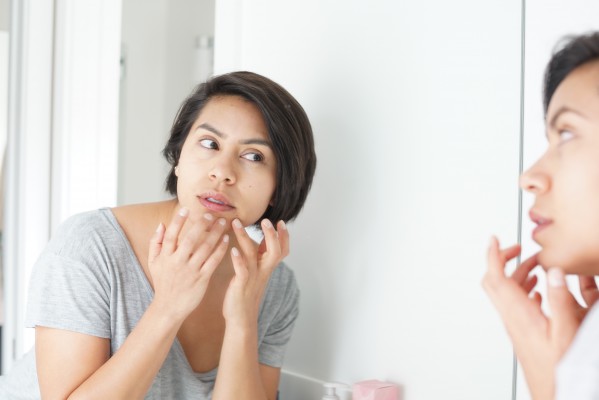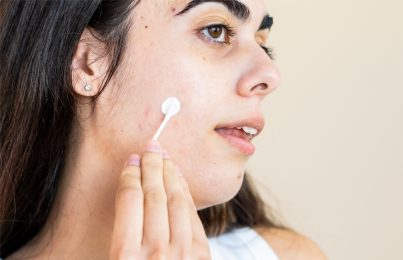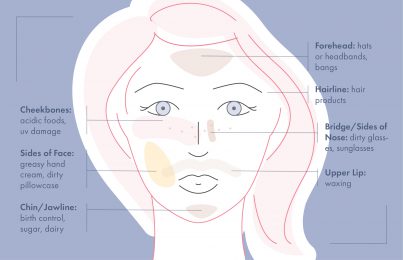Updated 08/05/21. As a skincare expert and esthetician for over 30 years, I’ve been asked every skincare question imaginable, but the one I hear most often is, “My teenage years are long gone. Why do I still get blemishes as an adult?” Due to hormonal fluctuations carried over from your teenage years, it’s not uncommon to experience breakouts well into your 20s, 30s, and beyond. In fact, adult acne is on the rise.
Adult breakouts tend to be less frequent than teenage breakouts. Thus, it’s normal to question why you have perfectly clear skin for weeks, then one day a blemish appears out of nowhere. Is it from stress? Is it from not washing your face? Is it diet-related? Is your dirty cell phone to blame? What about PMS? The answer isn’t always easy to find. However, if you still get occasional blemishes, ask yourself these 11 questions and you just might find the cause.
The 11 Most Common Causes of Adult Acne
1. Do you touch your face often?
This may come as a surprise, but subconsciously touching your face all day causes it to become the dirtiest part of your body. While it’s important to wash your face every night to remove impurities, it’s also important to avoid adding to it unnecessarily throughout the day. Avoid touching your face and you’ll also avoid adding bacteria (and other less-than-ideal things like dead skin, dirt, and oil) to the skin that could potentially be a trigger for breakouts.
Pro Tip: If you find yourself subconsciously touching your face throughout the day, try to keep your hands occupied with a toy or gadget. I recommend the No Picking! Twisty Toy. It’s a fun and easy way to help you keep your hands off your face.
2. Have you been eating more dairy than usual?
If you’re developing cystic blemishes (those hard, painful, underground bumps that can linger for weeks) on your chin, jawline, or neck area, it might be a sign that you’re consuming more dairy than your body can tolerate. That’s because your skin acts as an excretory system to get rid of things with which your body doesn’t agree. When you consume too much dairy, it’s going to be harder to digest by nature, which can cause cystic blemishes to appear on the lower area of the face. Read more about the link between dairy and cystic blemishes.
By the way, it’s not just dairy, either. Certain research has linked high-glycemic diets with increased rates of inflammatory breakouts. High-glycemic foods include those that are high in sugar (like baked goods) as well as processed carbohydrates (like white bread, pasta, and other starchy foods). Consider swapping these out for low-glycemic foods like fruits, vegetables, and whole grains. Read more about how the food you eat really affects your skin.
Pro Tip: The best way to determine if your cystic blemishes are directly related to your dairy intake is to completely cut dairy out of your diet for at least three weeks. Keep a food diary and log every single thing you eat. This will hold you accountable. If you don’t develop any new cysts after cutting out dairy, you can assume there’s a link. That doesn’t necessarily mean you can’t ever eat dairy. Slowly introduce it back into your diet. The point at which you start breaking out again shows your tolerance level.
3. Have you been under tremendous stress lately?
I’ve certainly had personal experiences that confirm a link between breakout activity and periods of high stress. A study conducted by the Stanford University School of Medicine backs this up. It concluded that exam stress worsened students’ acne. According to the researchers, “increased acne severity was significantly associated with increased stress levels.”
Stress doesn’t just increase breakout activity. It generally worsens the overall skin condition by inducing the adrenal glands to overproduce cortisol. This is a steroid that causes sebaceous glands to produce more oil, which in turn, makes the skin oilier. Thus, during stressful periods, people tend to experience an increase in inflamed, pus-filled papules rather than simple whiteheads or blackheads.
Pro Tip: The easiest way to reduce stress is to get seven to eight hours of sleep every night. The research supporting this is crystal clear. Sleep (or lack thereof) affects every aspect of physical and mental health. It’s essential, not just for tissue repair and regeneration, but for maintaining strong immune function (this is necessary for keeping blemishes at bay). You can also consider mindfulness-based stress reduction, such as meditation, which has been shown to benefit the body and the skin in multiple ways, including through the reduction of inflammation.
4. Do you ever skip washing your face at night?
We know that sleeping with our makeup on is bad. However, we must also think about all the oil, dirt, and debris that builds up on our skin each day. Make no mistake—this combination can absolutely trigger adult acne. So, if you want a clear and healthy-looking complexion, you must wash your face each night with a gentle, sulfate-free cleanser.
Pro Tip: The number one reason people skip out on washing their face at night is fatigue. If this sounds like you, try performing your nighttime skincare routine earlier in the evening when you’re less tired. In fact, your skin could benefit from this for a couple of reasons. Did you know your skin has a circadian rhythm and starts to repair itself as soon as the sun goes down? Removing the day’s makeup, dirt, oil, and debris gives your skin a clean slate for all the performance-based nighttime products to follow. I talk about this more in this video.
5. Have you started using new skincare products?
When you introduce new products into your skincare routine, you might experience some initial purging. This refers to a process in which lingering breakouts that might have taken weeks (or even months) to surface come up all at once due to the introduction of a product that boosts the rate of cellular turnover. This purging may happen if the products you’re introducing are exfoliating your skin more than it’s used to. (This is actually a good thing; exfoliants restructure the skin’s natural cell turnover process.) However, if the purging continues for more than four to six weeks, this means the products may not be a good fit for your skin.
Pro Tip: When introducing new products to your skincare routine, I always recommend using one for three to four days before adding a second new product into the mix. That way, if your skin reacts negatively, it will be easier to determine which product caused it. With that being said, some breakouts can take weeks to appear, so this isn’t always a completely sufficient test. When it comes to allergic reactions and rashes, though, it’s a good place to start. Read more about how to avoid a negative reaction to new skincare products.
6. Are you about to start your menstrual cycle?
Many women experience a surge of breakouts at the start of their monthly cycle. This is completely normal (and common), but it can also be very frustrating. During your menstrual cycle, progesterone levels increase, putting pressure on pores and creating a narrower pore lining. Additionally, oil can become thicker during this time because of a natural imbalance of hormones during the pre-period hormonal shift. when thicker, oil tries to get through a narrower opening, and this creates an ideal environment within the skin for breakouts.
Pro Tip: Taking vitamin B-6 every day for one week prior to your cycle may help regulate hormonal imbalances. Calcium-magnesium supplements may also help when taken during this time. I advise switching up your skincare routine to minimize bacteria. Read more about monthly hormonal breakouts and what you can do to stop them.
7. Do you suspect your hormones might be off?
Hormones are chemical messengers, created by our bodies to regulate everything from metabolism to cell growth to reproductive cycles and mood. When they fluctuate, they can trigger weight gain, depression, sleeplessness, and fatigue in addition to adult acne. A common sign of hormonal imbalances is an inconsistent, sporadic, or even nonexistent monthly cycle.
Pro Tip: I advise consulting a physician or gynecologist to see if they can run tests to check your hormone levels. From there, they may have recommendations about how to treat the imbalance internally. On that note, read up on how birth control pills may affect your skin.
8. Have you flown on a plane in the last week?
I can personally attest to this one. Flying on an airplane throws my skin out of whack, and it usually culminates in post-flight breakouts. This is because the cabin of an airplane has extremely low humidity, which causes the skin to become dehydrated (I even did an experiment to prove this). When an oily skin type becomes dehydrated, the skin tries to repair itself by producing even more oil. Since oil breeds bacteria and “bad” bacteria lead to breakouts, flying on a plane can surely cause problems.
Pro Tip: Whenever you fly on an airplane, you should have two main objectives to reset your skin once you arrive at your destination. The first is to exfoliate dry surface cells. The second is to hydrate the newly exposed cells and reduce oil and bacteria from within the pores—doing so can help minimize breakout activity. I count on the Rapid Response Detox Masque to do this. As for in-flight skincare, I don’t recommend using a hydrating facial spray—here’s why.
9. Have temperatures been fluctuating?
When the weather is warm one day and cold the next, it can really leave your skin confused, and as we know, unbalanced skin can lead to blemishes! This particularly becomes a problem when the seasons are changing. Read how to update your skincare routine from summer to fall.
Pro Tip: If temperatures are fluctuating, adjust your skincare routine slightly (the keyword here is “slightly”). You don’t want to do a major overhaul, switching your entire routine over to breakout-focused products. Overcompensating like this can leave your skin dry and irritated. Instead, temporarily switch to an exfoliating acid serum that contains salicylic acid.
10. Are you using an IUD?
IUDs, while a very popular form of birth control, can cause acne. This is listed as a side effect of IUDs containing progesterone, specifically Mirena, Skyla, and possibly Liletta. The IUD releases progestin into the body, which is converted into progesterone. This turns into various types of testosterone, which can overstimulate oil glands. When oil mixes with dead skin cells in the pore lining, breakouts can occur (particularly cystic breakouts). Learn how one client got rid of hormonal breakouts caused by an IUD.
Pro Tip: Since the underlying cause of IUD-induced breakouts is a hormonal imbalance, it’s best to consult your physician. He or she can help you explore the possibility of starting hormone-regulating medications to counteract the testosterone. Some people see an improvement from a medication known as Spironolactone. It was originally developed as a diuretic to treat high blood pressure, but it’s now being prescribed off-label for the purpose of improving adult acne in women. It works by blocking androgen hormones from stimulating oil glands. Another option is a patch that releases a small amount of estrogen. If need be, some people simply have the IUD removed. Speaking with your physician is the best way to find out what option is best for you.
11. Have you recently started using a sonic cleansing brush or facial scrub?
When rubbed too abrasively on the skin, sonic cleansing brushes and coarse facial scrubs can increase breakout activity. I think this may have something to do with the type of product that’s applied afterward. Physical exfoliators like these can potentially create pathways in the pores into which pore-clogging moisturizers can enter. This can create blockages in the pores, which can lead to bumps and breakouts. This isn’t a hard and fast rule, as some people find these products can lessen breakouts. However, I know I personally need to be careful with facial scrubs. As for sonic cleansing brushes, I never use them—here’s why.
Pro tip: When using a sonic cleansing brush or facial scrub, avoid using too much pressure. Instead, go lightly over the skin. When it comes time to apply your next product, pay close attention. Choose an oil-free serum and moisturizer, which are better choices for breakout-prone skin.
There you have it—these are 11 of the most common causes of adult acne that I tend to see. It’s very, very challenging to ever truly know why breakouts occur in adult years, but hopefully, this post provided you with some fresh insight as well as some new techniques to try.
Next, learn how to deal with maskne if you think your protective face mask is the cause of your breakouts.
Celebrity Esthetician & Skincare Expert
As an esthetician trained in cosmetic chemistry, Renée Rouleau has spent 30 years researching skin, educating her audience, and building an award-winning line of products. Her hands-on experience as an esthetician and trusted skin care expert has created a real-world solution — products that are formulated for nine different types of skin so your face will get exactly what it needs to look and feel its best. Trusted by celebrities, editors, bloggers, and skincare obsessives around the globe, her vast real-world knowledge and constant research are why Marie Claire calls her “the most passionate skin practitioner we know.”




Comments:
I’m 56 years, so much stress lately because if the virus, loosing family members. Is there anything I can do it take to help with pimples under skin on chin. I don’t wear much make up. I think it is all stress.
Posted By: Carrol |
I’m so sorry to hear that. Stress can be so hard on the skin! I would suggest making some time to unwind and treat yourself to a hydrating, breakout reducing mask like Rapid Response Detox Masque!
Posted By: Ella Stevenson |
I’m 72 & am experiencing first ever spots on jaw & chin like big milia then proper spots very red. What to do? Stress, dairy or phone bacteria?
Posted By: Katie |
Hello Katie, It’s hard to know why you get breakouts, it very well could be one of these or it could be from something entirely different. I suggest you consult with an experienced esthetician to help improve your skin. They will have experience about skin that should be very helpful for you.
Posted By: Renée Rouleau |
I am actually surprised my skin is not worse than what it is because I’m very harsh to my skin. After reading this article I’ve learned that my regimen is too unstable and sporadic since I constantly experiment with different products new lines of products cheap lines or brands with harsh chemicals or detergents that break down my lipids and not to mention all the medication and antibiotics I’ve been on recently breaking down my connective tissues slowing cell growth or repair due to lack of sleep and nitrition. My love of dairy and chocolate hormonal changing foods. I rarely wash off my makeup before bed thinking that just because I applied it in the afternoon instead of morning that it’s still fresh enough to keep it on my skin but really even stepping out of the house for a short time can be damaging due to pollutants in the air the dirt oil and dust building up on the skin has to be removed every single night. My sleep patterns are all off due to stress at work, relationships, and worries that I don’t give my skin the time and rest it needs to repair itself and remove toxins during my REM sleep that I’ve noticed the difference in my skin’s elasticity and tone. Beauty sleep is no joke it’s very necessary. Also eating plenty of hydrating nurishing fruits that also contain rare peptides to naturally replenish those peptides the body needs daily is necessary for skin maintenance and cell turnover. Im a student esthetician so I’m always doing research on skin processes and the skin’s reaction to climate, lifestyle, diet, routine care, products, treatments, and environmental issues. Thanks for your post’s additional knowledge and information that I learned from reading it is very helpful for someone like me who is studying this as a profession.
Posted By: Erin Veronica Rocha |
I had cut almost all dairy out of my diet (I have a little bit of cheese on my almond flour pizza), but I recently started using a BCAA powder. It’s supposed to be pure BCAA with no sugar or additives, but the label says “contains milk.” I’m thinking it can’t be much milk, but a cyst just formed in my face so that could be it…
Posted By: Kyle |
I would suggest cutting out the BCAA and seeing what happens. So much of it is trial and error and just seeing how your body responds.
Posted By: Renée Rouleau |
Thanks for giving this information Renee. I’m gonna get rid of acnes and I got a real good knowledge about a freaking, time consuming and bad habbit.
Posted By: anku |
Thanks for such an informative article, Renee.
I was thinking the cause of my acne was due to either the brand that I’m currently using or my Clarisonic brush!
There is a mention that our skin changes as we grow older and we may need to switch products as they become less effective on our skin.
Will definitely try stopping the use of the Clarisonic brush first to see if it helps!
Posted By: Cee |
my skin got blemish around the cheeks area now its going to dark brown I already apply many typs creams and face pack but its stil like that can you please give me suggestion
Posted By: baljeet kaur |
Have you seen out Post-Breakout Fading Gel yet? Check it out here https://www.reneerouleau.com/PostBreakOutFadingGel.aspx It’s excellent for fading dark spots fro blemishes.
Posted By: Renée Rouleau |
I am 29 and have had acne since I was 21. All derms have told me it’s a hormonal imbalance especially because I get it around my jaw and chin. The only thing that works for me is being on the contraceptive pill (which I don’t use because I don’t want to take artificial hormones). The zits I do get leave read marks for ages – 6mths plus – even if I don’t touch them. So frustrating! I will try the dairy thing though.
Posted By: Yvette |
As a 45 year old woman who is still suffering from acne, I did speak with my ob/gyn re: hormonal imbalance and acne. He told me that a lot of conditions get blamed on menopause/pre-menopause, and that, in his opinion, I’m too young to default to menopause as a reason for my acne. Thoughts?
Posted By: Marcy |
Great informative information Renee, thank you. Now that you mention it, I do touch my fact too much!!! Good to remember not too.
Stephanie Lee
inquisitivecoach.com
Posted By: Stephanie Lee |